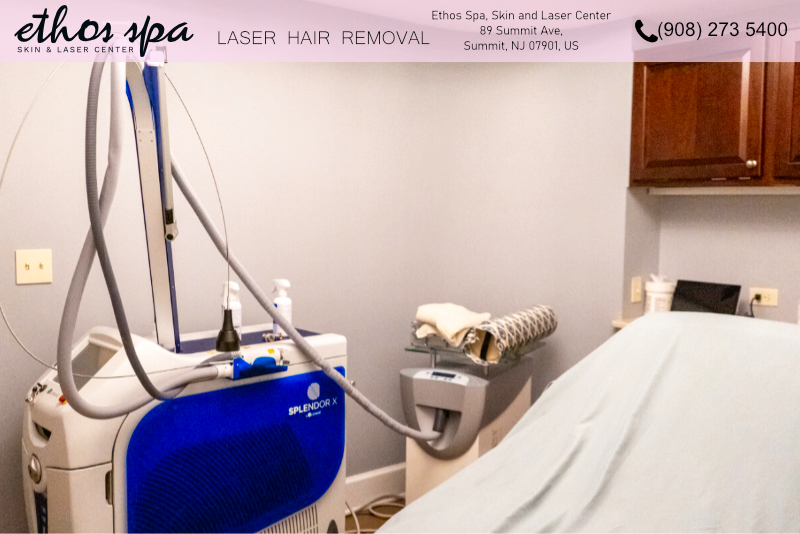
Book NowHome//Laser Hair Removal

According to a survey by Statista, around 385,000 laser hair removal treatments were performed in the United States alone in 2018. It’s a relatively straightforward procedure for most patients, and you’re far more likely to find long-term hair removal and management easier if you go through laser treatments. But before you get any kind of laser treatment, you need to make sure that your skin is compatible with the procedure.
But why should you make sure that your skin type matches your laser treatment? Laser hair removal is more efficient and has fewer complications if you use the correct laser with your skin type. This is usually determined by whether you have fair or dark skin.
How Skin Types and Laser Hair Removal Interact
Your dermatologist will often base your laser hair removal on the Fitzpatrick Scale, a measurement tool that’s used to classify your skin type based on your ethnicity, tanning ability, and overall pigment (or melanin content) of your skin. The Fitzpatrick Scale has six levels of classification for different skin types:
| Ethnicity | Skin color(melanin levels) | Reaction to tanning | |
| Type 1 | Albinos and redheads | Very pale, white, ivory, always has freckles | Burns and peels very easily and doesn’t tan |
| Type 2 | Most Northern Europeans | Pale white | Usually burns and peels, rarely tans |
| Type 3 | People from the Meditteranean or the Middle East | White, light brown, or beige with golden undertones | May sometimes burn and gradually tans |
| Type 4 | Most East Asians, Indians, and Pakistanis | Olive or light brown | Rarely burns but tans easily |
| Type 5 | Most Africans, South East Asians, and people from Latin America | Dark brown | Burns and tans easily |
| Type 6 | Some Africans and dark-skinned Asians | Deep brown | Rarely burns and never tans |
Before you get any type of laser hair removal, it’s important to establish your skin type first. The laser used in hair removal is attracted to color, which might damage darker skin. Because lasers are directed to pigments in the hair follicle, any pigments in the skin can be affected if the laser is powerful enough. This may cause complications like:
1. Burning
Because of the high heat generated during laser hair removal, people with darker skin can experience burns if the laser is too strong and starts burning away skin pigment. This may cause discoloration, hyperpigmentation, or general skin irritation that can affect the results of the procedure. However, this complication is relatively uncommon.
2. Skin infection
If a strong enough laser is used on the skin, the exit point for removed follicles can get infected with bacteria. This can lead to serious skin complications and may require intense post-operative care to treat or manage. Because of the ablative nature of some laser treatments, even low-wavelength laser hair removal can cause significant wounds in the skin.
3. Increased or decreased hair growth
With some rare cases (usually with people with darker skin), the hair that grows around the laser-treated area may be thicker or return at a faster rate. Because the laser treatment damages the hair follicles so they fall out easier, the intensity may affect the skin around the laser treatment. This can cause visual changes to the hair around the area and may affect hair growth.
Even if the intensity of the laser used in hair removal isn’t anywhere close to other commercial-grade lasers, it’s best to make sure that your skin type can tolerate the treatment. Most dermatologists will check their patient’s family history, reaction to sunburns, and overall melanin levels before recommending the specific type of laser to use with their hair removal.
Types Of Laser Hair Removal
There are four types of lasers usually used in laser hair removal:
Ruby lasers
Ruby laserslaser hair removal
However, this type of laser hair removal will require multiple sessions to make sure that all the hair is removed, and is best suited for smaller treatment areas.
Alexandrite lasers
The Alexandrite laser is the most popular option for laser hair removal since it covers sizable areas in a short time. However, this efficiency also makes it one of the most uncomfortable laser treatments, since the laser pulses have almost no delay and repeat rapidly. This laser also penetrates the skin better, which allows for more hair removal.
Alexandrite laser treatments usually last for one to three sessions, depending on the area and the patient’s pain tolerance.
Diode lasers
Diode lasersother lasers
However, diode laser treatments can be relatively expensive, with most cosmetic practices lacking the tools or expertise to operate the machine.
Nd:YAG lasers
Most lasers used for hair removal don’t penetrate the upper layer of the skin, since their wavelengths cannot pass through the melanin without damaging it. However, Nd:YAG lasers can target pigments deep within the dermal layer which allows for efficient removal of coarse or tough hair.
Nd:YAG lasers are relatively new technology, and you may have to check if your local cosmetic practice offers it as an option.
Here’s a table summarizing which type of laser works with which skin types:
| Laser | Compatible Skin Type/s |
| Ruby | Types 1, 2, and 3 |
| Alexandrite | Types 2, 3, and 4 |
| Diode | Types 4, 5, and 6 |
| Nd:YAG | Almost all types of skin |
While patients may use the Fitzpatrick scale as a baseline for the specific laser treatment to consider, dermatologists have the final say in what laser type to use.
Personalized Skin Treatments At Ethos Spa NJ

Confirming your skin type is a necessary step to make sure that you’re a suitable candidate for laser hair removal. This will lead to a better outcome after your laser hair removal and will make you less likely to suffer from any complications and aftereffects from undergoing laser treatment.
At Ethos Spa, we have extensive experience in laser hair removal treatments and other skincare improvements, delivering fast results with excellent customer service. Our staff is highly trained with all the tools and equipment required, ensuring you get the results you want.
For more information about our services, schedule an appointment with us today.






































